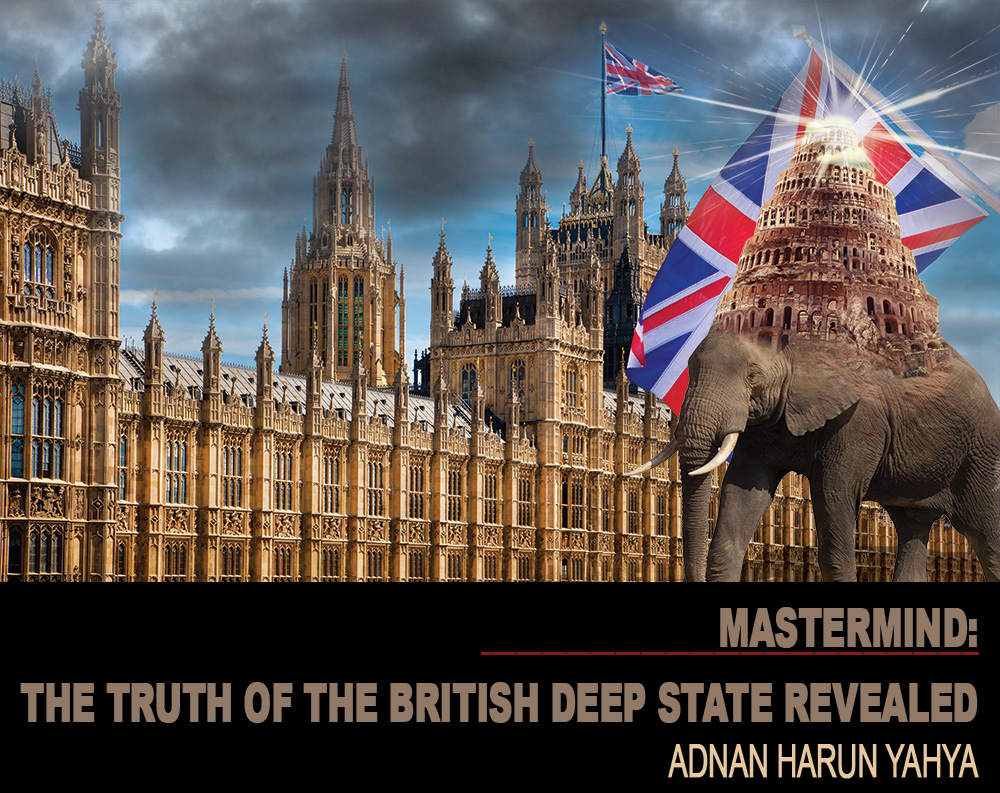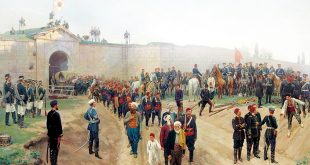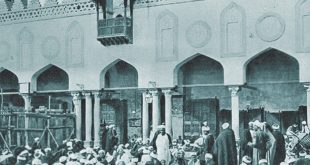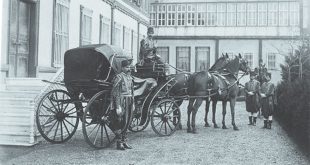British ambassadors, consuls and diplomats merit special consideration in any study regarding the activities of the British deep state in the Ottoman Empire. These officers, who were in the Ottoman lands supposedly to serve as diplomats, were most often working as spies. Indeed, they immensely helped the British deep state achieve its goals. Some of them befriended Turkish bureaucrats, some tried to sway Turkish politics. Some of them incited and offered logistic support for riots among minorities living peacefully until then on Ottoman lands. When acts of friendship or promises of economic assistance didn’t work, they didn’t hesitate to resort to threats or blackmail.
The British deep state used professional spies, too. These people could be disguised as archeologists or travelers, and worked to incite anti-Ottoman sentiments among minorities living under Ottoman rule. One notorious example is the British archeologist/agent Gertrude Bell, who planned and put into action the riots in Iraq, Syria and Jordan. Bell, with her spying activities, impressed the British deep state so much that she was later referred to as ‘daughter of the desert’ or ‘the uncrowned queen of the desert’. Speaking fluent Arabic, Persian and Turkish, Bell befriended local people and merchants in Ottoman-ruled Jerusalem, Syria and Iraq. With the pretense of carrying out archeological studies, she drew maps of the regions and sent them to the British Royal Geographical Society. She contributed to the Ottoman losses of Mosul, Baghdad and Basra.
 |
| British archeologist/spy Gertrude Bell at a picnic with Emir Faisal. In a couple of years, Gertrude would break Iraq away from the Ottoman Empire and Faisal would be its king. |
 |
| (1) From left to right, Wyndham Deedes, Emir Abdullah, Herbert Samuel, Gertrude Bell (2) T. E. Lawrence hand in hand with Emir Abdullah |
At the Paris Peace Conference of 1919, Bell helped Churchill, one of the most prominent members of the British deep state, draw the borders of Iraq with a ruler.
The British spy T. E. Lawrence was responsible for the Arab riots in Hejaz, as the readers have seen in the previous chapter. The British deep state used Lawrence for sedition and provided money and arms to Arabs, to be used against the Ottoman administration. After the riot, the region came under British control.
The order that ‘Lawrence of Arabia’ gave to Arab rebels as the Turkish army was withdrawing clearly showed his hatred of Turks: “The best of you brings me the most dead Turks! No prisoners!”139
 |
| The Cairo Conference held secretly in 1921, with Winston Churchill as the chairman. The picture shows spies Bell and Lawrence. |
 |
|
| 1. Mediterranean 2. Lebanon 3. Syria 4. Golan Heights 5. Iraq 6. West Bank 7. Gaza Strip |
8. Jordan River 9. AMMAN 10. Dead Sea 11. Israel 12. Egypt 13. Saudi Arabia |
| The concave section in the Jordan-Saudi Arabia border, pointing towards Amman, is called Winston’s Hiccup. | |
Bell and Lawrence attended the Cairo Conference held in 1921, with Churchill as the chairman. Churchill nicknamed the participants of the gathering ‘Forty Thieves’ for plundering the Ottoman territory. At the conference, it was agreed that Britain should maintain its mandate over Palestine and Abdullah from the Hashemite house should be the king of Jordan, while Faisal from the same house should be the king of Iraq. It was also decided that Husain, the Sharif of Mecca, should control the Hejaz, while the House of Saud should control the Arab peninsula and the Nejd. Britain would provide financial assistance to all of these people, while the Royal Air Force would be responsible for the security in the area. In line with the decisions, the British bombed thousands of settlements and martyred tens of thousands of civilians. All those lands shared at the conference were former Ottoman territories. The zigzag shape on the Jordan-Saudi Arabia border is known as ‘Winston’s Hiccup’. Years later, Churchill said that he had created Transjordan “with the stroke of a pen, one Sunday afternoon in Cairo”.140 It was this easy for the British deep state to play with countries, states and peoples.
A Report on How the British Deep State Influenced the Ottoman Statesmen |
| The ambassadors of the British deep state were able to make the Ottoman Empire enter war at will, made it sign peace treaties that worked to the British advantage, deposed Ottoman sultans, and had grand viziers executed. They achieved this power by means of certain Ottoman statesmen that were under their control. These people were hypocrites who betrayed their country and chose to serve the British deep state. For this reason, the British deep state has kept a close watch on Turkish statesmen throughout history. One report that G. Barclay, a British embassy officer, sent on January 18, 1907 is a good example of this trend. The report, which provided information about senior Ottoman officers to the British deep state institutions, included characterizations and even derogatory remarks about these people and even their wives. Some of the examples from the report can be found below:
Grand Vizier Kamil Pasha: Cypriot Jew. Talented and honest. Exiled to Rhodes and sought refuge in British Consulate. Said Pasha: Former grand vizier. Also known as Little Said Pasha. Extremely energetic and ambitious. He deeply loves his country. Extremely intelligent. Very impatient. He was pro-British before, but now he supports Russians. Tevfik Pasha, Minister of Foreign Affairs: Lacks diplomatic skills. Although his wife is German, he suspects the Germans. Memduh Pasha, Minister of Internal Affairs: Very narrow minded, hostile to Christians. From time to time, he worked in line with the British interests. Notorious for his shameless acceptance of bribe. Ferid Pasha: Grand Vizier. Supported by Germans. He always supports Germany. Ragıp Pasha, Chamberlain: One of the top people that can influence the Sultan. Made a huge wealth by using Palace’s influence. Close to British interests. Mehmet Nuri Bey: Son of a French man named Chateauneuf. Studied in France. A spy for the Palace. Despite his good looks, he is a degenerate. The British Foreign Office continued to gather systematic information about Turkish statesmen. (The most recent example is the archives disclosed by WikiLeaks). Other arrogant diplomatic language was found in the archives of 1933-1939, in the form of classified information sent by Percy Loraine to London, who was British ambassador to Turkey, with the note ‘on Leading Turkish Personalities’. The letter had unofficial information about 96 administrators, journalists and intellectuals of the newly founded Republic of Turkey: Yunus Nadi Abalıoğlu: Journalist. Short, fat. Wears butterfly glasses. Can change his mind quickly according to the circumstances. A heartless, spineless man. Celal Nuri İleri: Journalist. Extremely pro-Western. Smart. Sly. Probably has communist tendencies. Ahmet Ağaoğlu: Son of a Jewish man of Caucasia who embraced Islam. Worked for Russian secret service. After 1926, he sort of softened his stance against Britain. Yakup Kadri Karaosmanoğlu: Small stature. Mediocre in looks. Nice wife, speaks English. Ahmet Ferid: Pro-Bolshevik. Opportunist, has no principles. His attractive wife helped him with his achievements in London Embassy. Kazım Özalp: Most possibly anti-German and anti-Bolshevik. Poker addict. İbrahim Tali Öngören: Physician. Ox-headed, short. Hasan Saka: Was a Bolshevik sympathizer. Unattractive. Rowdy. Ali Çetinkaya: While he was the Minister of Public Works, worked to nationalize foreign companies. Fethi Okyar: Has a Mongolian face. Modest man. Has a very attractive wife who speaks English.1 |
| 1. Soner Yalçın, ‘İngiliz ‘WikiLeaks’inde Ünlü Türkler’, (Famous Turks in the British WikiLeaks), Hürriyet, 04.12.2010, http://www.hurriyet.com.tr/ingiliz-wikileaks-inde-unlu-turkler-16452176 |
Some British Spies That Managed to Infiltrate the Ottoman Empire
Ármin Vámbéry
 |
| Ármin Vámbéry became a spy for the British deep state after he gained the trust of Abdul Hamid II and earned a residence in the Palace. |
Hungarian Ármin Vámbéry, who had multiple titles before his name, like traveler, explorer, dervish, lecturer, author and international negotiator, was a professor of oriental languages at the Royal University of Pest. He came to the Ottoman Empire to study Turkology in Central Asia and spied on the Ottoman Sultans for the British deep state. He was raised Jewish, but later converted twice. He first became a Christian, then a Muslim. He spoke five languages.
Despite having lost his faith at a young age, he disguised himself as a dervish traveling around Central Asia. He subscribed to Darwinist/materialist thinking. In 1857, he arrived at Istanbul and began giving private lessons at the Palace. He was constantly by the side of Sultan Abdul Hamid II and gave private French lessons to Midhat Pasha. He was the only person that could gain the trust of Abdul Hamid II in a very short amount of time.
According to Richard Norton-Taylor of The Guardian, ‘His putative usefulness for the British was that he had the ear of the sultan of Turkey, “your friend in Constantinople”, as his controller in London described him.’141
Sultan Abdul Hamid II called Vámbéry to Turkey in the 1880s. Consequently, he stayed at Yıldız Palace as the Sultan’s special guest. When Lord Salisbury saw that Vámbéry was able to enter the Palace, he invited him to the Foreign Office and tasked him with the duty of spying on the Sultan.
Owing to his linguistic abilities, Vámbéry was hired as a translator by the Ottoman Ministry of Foreign Affairs. Recognizing the potential Vámbéry represented, the Western media also hired him as Istanbul correspondent, hoping to benefit from his intelligence and observations. He was received with great enthusiasm particularly in Britain, and dinners were held in his honor; he even received an invitation from Queen Victoria.
The House of Commons raised the question whether there was any truth to the rumors that Vámbéry went to Abdul Hamid II on a special mission assigned by the Secretary of State for Foreign Affairs and if the rumors were true, what the mission involved. The answer was clear in stating that the rumors were completely baseless. However only one month prior, Vámbéry had gone to Istanbul upon instructions from Lord Salisbury and submitted a long, confidential report to the Foreign Office on Abdul Hamid II and the Ottoman Empire.
Sultan Abdul Hamid II said, ‘I also wish very much to reach a deal with the British; I will not hesitate to offer the necessary compromises, as long as they are willing, too.’ He even offered an alliance to the British by means of Vámbéry.142
Charles Arbuthnot
 |
| General Sebastiani and French officers as they are showing Sultan Selim and senior officers defense plans for Istanbul. |
Charles Arbuthnot was the British ambassador to the Ottoman Empire between 1804 and 1807. He was also behind the failed operation of the British navy attack on the Dardanelles Strait and its coming to the offshore waters of Prince Islands to threaten Istanbul.
Prior to the Dardanelles Operation of 1808, Russia invaded the Turkish lands of Moldavia and Wallachia without any declaration of war. Urged by the French ambassador Horace Sébastiani, the Ottomans began war preparations against Russia. However, British ambassador Arbuthnot, who was working in liaison with the Russians, issued an ultimatum to the Ottomans, demanding that Sébastiani be removed from Istanbul, a peace treaty be signed with Russia, an alliance treaty with the British be renewed, and British and Russian navy fleets be allowed to freely pass the Straits. Following this ultimatum, the British supported the Russians when they entered Moldavia and Wallachia, and then demanded that Dardanelles forts be surrendered to Britain. Ambassador Arbuthnot said that unless those demands were met, he would go to Bozcaada and come back with the British fleet to start bombarding Istanbul.
Arbuthnot on board, the British navy in Dardanelles sank four Turkish ships, with ten large galleys, and entered the Sea of Marmara to advance towards Istanbul. When the British fleet anchored at Istanbul, there were new demands on the list and the British insisted the Turkish navy be entrusted to the British. This attitude sparked immense outrage, first in the military and then among madrasah students. The people of Istanbul and, finally, the government decided to fight back. Key positions along the shore were arranged as defensive positions and some 300 cannons were placed. At the same time, people of the Prince Islands and fishermen were waging guerilla warfare on the British. This entire defense effort forced the British fleet to retreat. When their final attempt of a threat failed, the British navy withdrew completely. Artillery defense at Dardanelles did not let the British fleet pass through.
Henry Elliot
 |
| Midhat Pasha, the Grand Vizier |
Another notorious spy who worked for the British deep state was Sir Henry Elliot, the British ambassador to the Ottoman Empire. He was a close friend of Grand Vizier Midhat Pasha, who helped dethrone Sultan Abdülaziz Khan, and caused Egypt to come under British rule by issuing the edict that allowed Egypt to borrow money from foreign creditors. Elliot was one of the architects of the coup of 1876 and the Russo-Turkish War (1877-78).
When Midhat Pasha became Grand Vizier after the coup, he held the ‘Constantinople Conference” (aka the Shipyard Conference) in Istanbul with the participation of the British. In this conference, which was meant to prevent war, the Ottomans were pressured to give independence to Serbia and Montenegro, as well as autonomy to Bosnia Herzegovina. Britain knew perfectly well that the Ottomans would never accept such conditions and that they would declare war instead. Indeed, when the agreement requirements were disclosed, it was again Britain that urged Midhat Pasha to resist, promising that in case of war, he could trust Britain. Finally, what Elliot (in other words, the British deep state) wanted came true, and the Ottoman Empire and Russia declared war against each other. This war caused the Ottoman Empire one of its greatest territorial losses. Once again, those familiar tactics were in play and the ‘peace’ agreement was signed with the mediation of the British.
One of the most notorious tactics of the British deep state is egging on two sides, making them fight and then mediating a peace agreement between them. Similarly, the Treaty of Karlowitz of 1699, with the Ottoman’s first major territorial losses in the West, was signed under pressure from British Ambassador William Paget, 6th Baron Paget. The Treaty of Passarowitz, signed after the Ottoman-Venetian and Austro-Turkish Wars of 1715-1718 and which also saw Ottoman territory losses, was also signed with British ambassadors as the mediators. All of these treaties were actually the result of British deep state policies. This shouldn’t be surprising – it has always been the British deep state that secretly set the stage for the conflicts and provoked the wars. The real winner after these treaties has always been the British deep state. The Ottoman Empire, on the other hand, came one step closer to destruction every time it was forced to sign a treaty at the instigation of the British deep state.
Austen Henry Layard
Henry Layard, who succeeded Henry Elliot as the British Ambassador to the Ottoman Empire, was another spy that worked disguised as an ambassador. Having been appointed as a Privy Council member by the Gladstone government, Layard is considered the person that ensured British control over Cyprus via the Cyprus Convention of 1878. Even though he seemed to be pro-Turkish, his main policy was making Russians and Ottomans fight and weaken each other, thus playing into the hands of the British deep state. Abdul Hamid II granting certain facilities to the British deep state, which would make it easier for Britain to gain control of Cyprus, made Layard’s job much easier.
Layard informed Robert Gascoyne-Cecil, the then British Secretary of State for Foreign Affairs that, according to Islamic tradition, for an administrator to be removed from the position of Caliph and dethroned, he had to be mentally ill. A scheme based on this information brought about the dethronement of Sultan Murad V, to be succeeded by Abdul Hamid II, who had to give into the pressure of the British deep state. This was a grim example of how the British deep state could change even the Ottoman Sultans using its spies.
Footnotes:
139. Matthew Eden, The Murder of Lawrence of Arabia, New York: Thomas Y. Crowell, 1980, p. 180; T.E. Lawrence, Seven Pillars of Wisdom, Wordsworth Editions, 1997, p. 628
140. Frank Jacobs, “Winston’s Hiccup”, The New York Times, March 6, 2012, https://opinionator.blogs.nytimes.com/2012/03/06/winstons-hiccup/?_r=0
141. Richard Norton-Taylor, “From Dracula’s nemesis to prototype foreign spy”, The Guardian, April 1, 2005, https://www.theguardian.com/politics/2005/apr/01/highereducation.artsandhumanities1
142. Mim Kemal Öke, Saraydaki Casus: Gizli Belgelerle Abdülhamid Devri ve İngiliz Ajanı Yahudi Vambery [The Spy in the Palace: Documents Tell About the Rule of Abdul Hamid II and the British Spy Jewish Vambery] Istanbul, November, 1991, p. 252
 British Deep State MASTERMIND: THE TRUTH OF THE BRITISH DEEP STATE REVEALED
British Deep State MASTERMIND: THE TRUTH OF THE BRITISH DEEP STATE REVEALED



